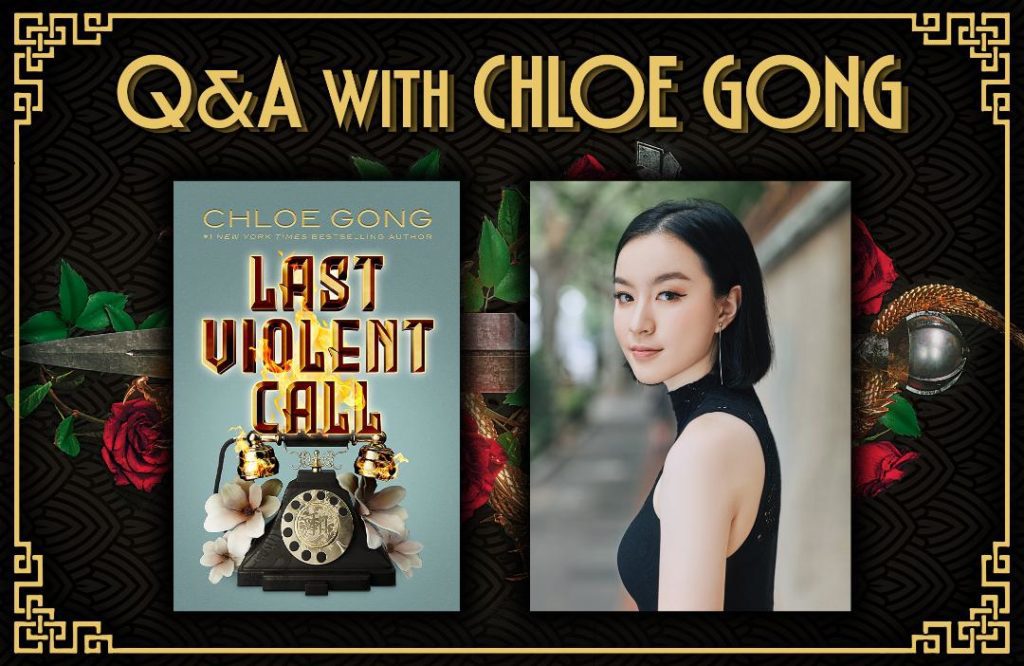
Valentine’s Day is coming up and who doesn’t love a good enemies to lovers trope? I personally cannot get enough, especially when it includes two opposing gang members who would just as soon shoot one another as they would kiss one another. Add in some fantasy elements and drop this story in Shanghai and you have the most fantastic Romeo and Juliet retelling imaginable. Yes, I’m talking about Chloe Gong’s books. You may recognize this New York Times Bestselling author, but if not, here’s a little run down. She wrote These Violent Delights and Our Violent Ends, which is the story of Roma and Juliette and soon after published Foul Lady Fortune, set in the same world but following the character Rosalind, who has a major role in the first books. Now, she’s dropping Last Violent Call which includes two novellas and revisits Roma and Juliette, as well as two other characters named Benedikt and Marshall. Roma and Juliette are the heirs to two different family gangs and even though they are supposed to hate each other, they can’t seem to stay away from one another.
Whether you’re celebrating love this Valentine’s Day, nursing a broken heart, or living your best single life, I can highly recommend her books. You’ll find love in these books, but you’ll also find heartbreak. You’ll experience sweet, tender moments, but you’ll also experience stunning betrayal. Where there’s pining, there’s also the chance that there will be gunfire. Chloe Gong’s world has it all, and therefore I think it’s the perfect themed read for the month of February! There’s something for everyone in them.
I was absolutely speechless that I was given the opportunity to interview Chloe ahead of her publication, as I am a huge fan of her work. I can’t wait to dive back into her world and see what these characters are up to. Somehow, I managed to find the words to communicate and unsurprisingly, Chloe was lovely to correspond with. Let’s get to it!
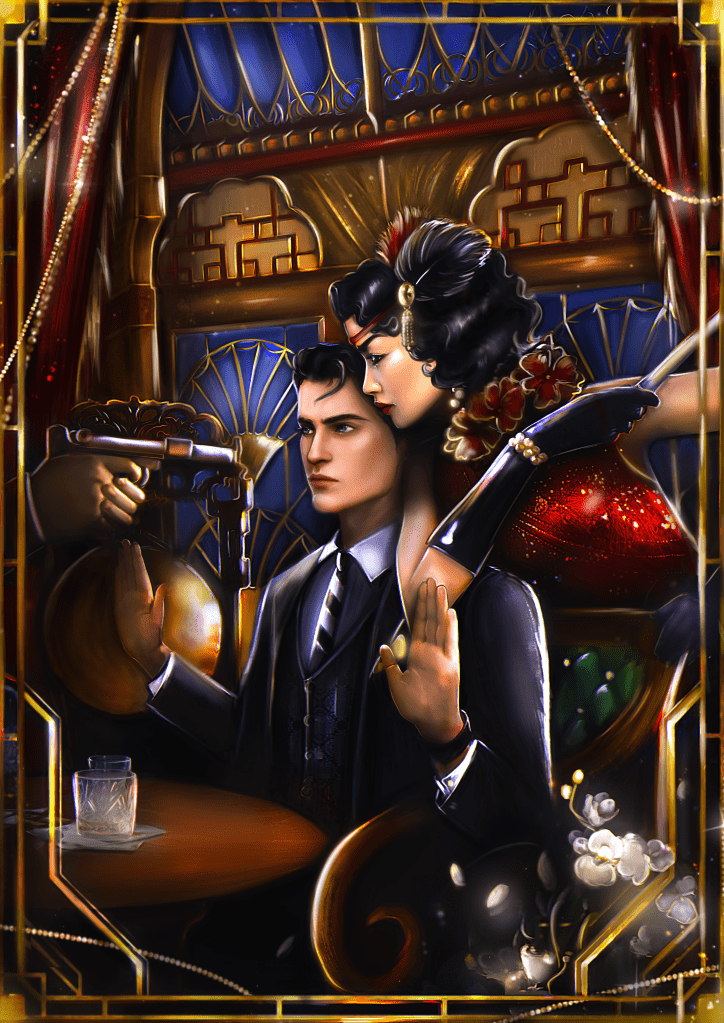
Q. When you started the duology for These Violent Delights, did you know you’d be continuing on in this world once you reached the conclusion of Juliette and Roma’s story? Was there a specific moment in which you felt compelled to continue with Rosalind’s story in Foul Lady Fortune? Did the idea for the Last Violent Call novellas come after or before the idea for Rosalind’s continuation?
A. Great question! It was after I finished the first draft of These Violent Delights that I decided I wanted to do a spin-off for Rosalind. Roma and Juliette’s story wrapped up nicely in two books—These Violent Delights and Our Violent Ends—but there was more I wanted to explore without holding onto Roma and Juliette as main characters. It wasn’t so much a specific moment as it was the realization that Rosalind was the only one who ended the These Violent Delights duology surrounded by the carnage of her mistakes with no room to redeem herself; the original duology wasn’t her story so it didn’t work to steer in her direction, and yet there was so much character development on her end that I was incredibly interested in. Of course, it’s presumptuous to go into publishing a series in the hopes that a spin-off series will be picked up, so I embedded bits and pieces while writing the original duology—and then I was lucky enough I got to see them to fruition when my publisher wanted to do Foul Lady Fortune and its sequel. Last Violent Call, meanwhile, emerged as bonus novellas after Rosalind’s continuation because I wanted a bridge between the two series for readers who were fully invested in both!
Q. Since the moment I heard about it, I thought a fantastical Romeo and Juliet retelling set in Shanghai was genius. I’m curious on the progression of this idea. Did your love of Shakespearean tales come first? Your love of the fantasy genre? Were you always aware that you wanted to write a novel set in Shanghai? Anything you’d like share on your journey to writing this unique story, I’d love to hear!
A. All of the above, honestly. The idea came to me as “warring gangster families in 1920s Shanghai,” which very quickly turned into its final form of “Romeo & Juliet in 1920s Shanghai”! I wanted to work with 1920s Shanghai as a setting because there’s so much rich history and aesthetic beauty in that era that I’m very familiar with. I had grown up with my parents’ stories about Shanghai, and I had also grown up reading and obsessing over YA books during its biggest commercial boom. While I wanted to pull from my own culture and its true history of a gangster-ruled decade, I was still pulling to tell the sort of fun, fantastical story that I loved reading, not to provide an educational textbook or anything of the like. The moment I put together those components I decided I wanted to the warring gangsters, but it would be impossible to write about a blood feud like that without getting Romeo & Juliet comparisons, so a retelling was so much more interesting to me.
Q. One of my favorite things to do is jot down the best quotes from the books I’m reading. Do you have any particular quotes from your novels that you’re especially proud or fond of?
A. There’s one line in Our Violent Ends where I wrote it and immediately thought “If this doesn’t end up on Pinterest boards, then I’ve utterly failed.” It was on Page 364 when Benedikt says “I would rather the two of you not burn the world down each time you choose each other.” I’m sure it’s ended up somewhere on Pinterest by now, but the funny thing about quotes is that it’s never the ones I think will pick up that do eventually end up becoming readers’ favorites!
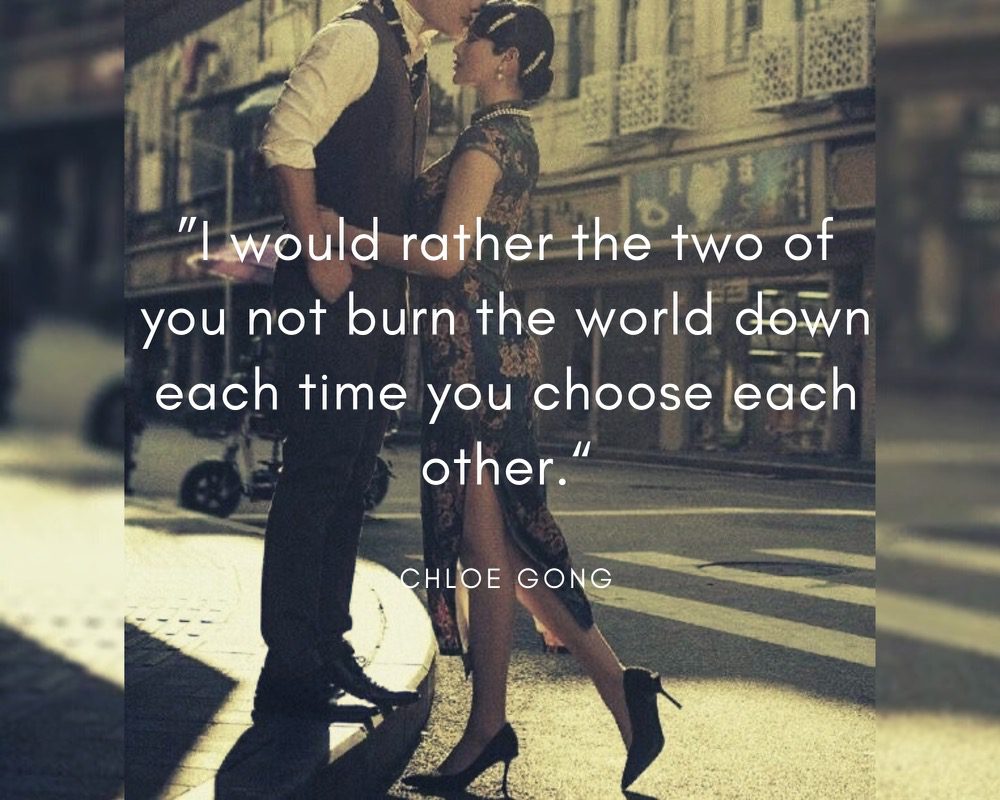
Q. You became a published author at a stage where most people are going through massive life changes and settling into what it means to be an adult. Were you prepared for the levels of attention you and your books received? Did the success of these novels change your path at all? Did the joy of writing books change in any way?
A. I had no idea what to expect by publishing at this time in my life, and although it came with its struggles, I wouldn’t have done it any other way. I started writing when I was 12/13ish and didn’t consider traditional publication as a possibility until I went to college, so by then I was very sure why I wanted to become an author, which is to tell stories and try to get them to go as wide as possible. I never expected These Violent Delights to debut so well—especially during a pandemic—but in pursuing publishing, I had hoped that my books would find the people who need them, and I’m so happy to have found such a wonderful audience.
The success of these novels altered my path immensely. It meant I graduated college and went straight into full-time writing. As an international student, if I chose being an author as my primary post-graduation path, I wasn’t allowed to take on other employment (i.e. a day job) for visa reasons, so it was truly a leap of faith that I only took because these books did well. It does mean that I have to treat writing seriously… it’s the only thing paying my rent, after all. Writing books is no longer that fun hobby back when I was 15, when I would squish myself onto the couch after my homework and tap out a chapter without any proof-reading. At the same time the additional pressure reminds me what an honor it is to write books as a living, because I have never had any other dream job and personally I think I would be so bad at corporate office culture. Everyone always jokes that I write at the speed of light to put out multiple releases per year, but I live in Manhattan and I’m a 24-year-old with only my writing to keep myself afloat! I adore my books and I adore the act of writing, but I’m also realistic about making a creative profession feel stable.
Q. Do you feel like social media is an important tool to succeed as an author? Do you prioritize self-marketing on any specific forms of social media or alternatively, search out bookish content from any specific ones?
A. I think social media is incredibly useful for an author’s success, but I don’t think it should ever be an author’s onus to use social media—in the traditional publishing sphere, at least. Nowadays things go viral in an instant and authors know their own books best so they’re the ones most likely to think about interesting angles when it comes to talking about themselves or their work. But, most of us choose traditional publishing for a reason, which is to focus on the writing while professional marketing teams do the marketing! If authors enjoy creating content, it’s a great avenue way to connect with readers—I use social media mostly out of my own enjoyment and if things pick up steam on their own, I count that as a hugely beneficial side effect. I try to keep up to date with bookish content and keep in touch with my readers on TikTok and Instagram in particular, but I never think of it as purely marketing. I feel as though the moment your viewers get the sense you’re talking to them as potential customers instead of readers, the content you’re creating doesn’t feel genuine anymore!
Q. Lastly, what do you hope to see more of from the fantasy genre? What do you hope to add to the fantasy genre with your books? If there’s one thing you hope a reader would gain from your books, what would that be?
A. I’d like to see the fantasy genre get more of everything, which feels a bit like a cheat answer but truly: diversifying what we allow in storytelling is only ever beneficial. There are still so many rules for the fantasy genre, a lot of them rooted in Western conventions, that I really want to see tested and overruled well. Of course, most genre rules are there for a reason, but I’m a believer that any rule can be broken as long as it’s understood and then subverted with intention. As far as my books go, I want to keep writing the sort of stories that I would have loved to read as a teenager. With any book I write, I look to myself as an audience first to make sure it’s something I feel passionate in investing time and energy into, and then I look outward in search for the exact readers who see these stories and go, “Oh. Oh, I like this too!”
I’d like to thank Chloe once again for taking the time out of her schedule to answer some questions for me. A big thank you to her team, especially Lindsey at Simon and Schuster for setting up the interview.
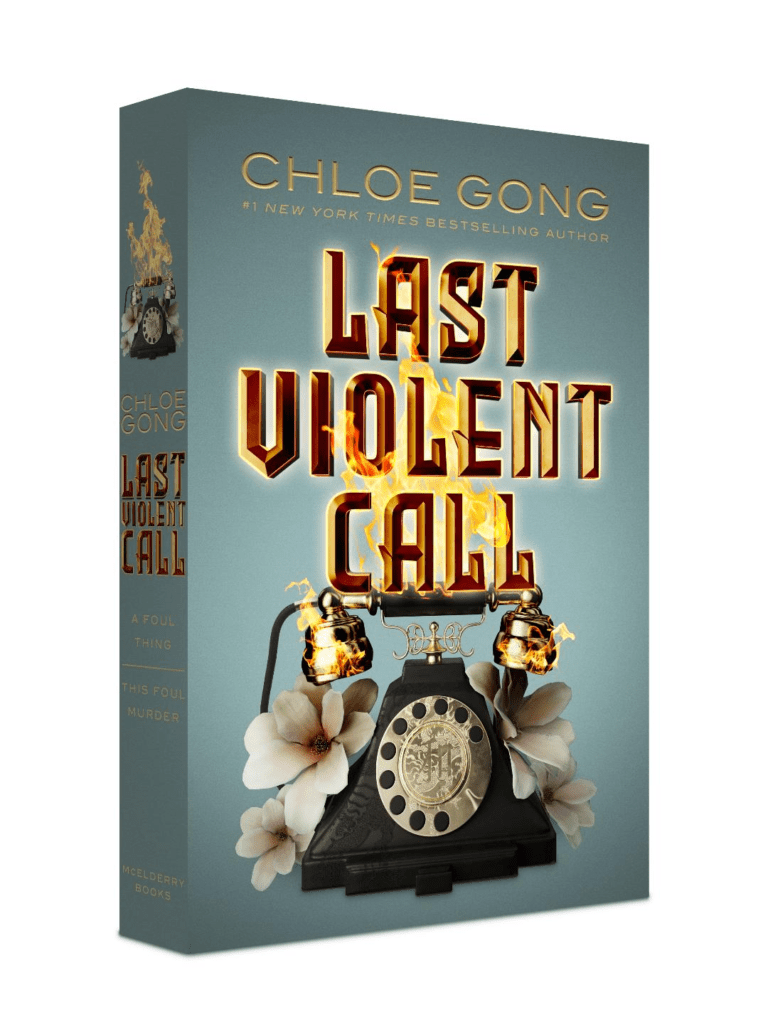
Last Violent Call is out February 23, 2023 at all major retailers. You can pick up These Violent Delights, Our Violent Ends, and Foul Lady Fortune today.
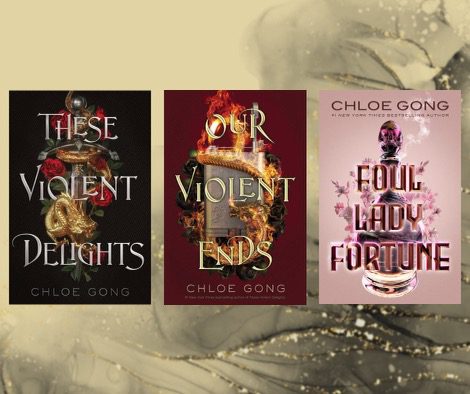
About the Author:
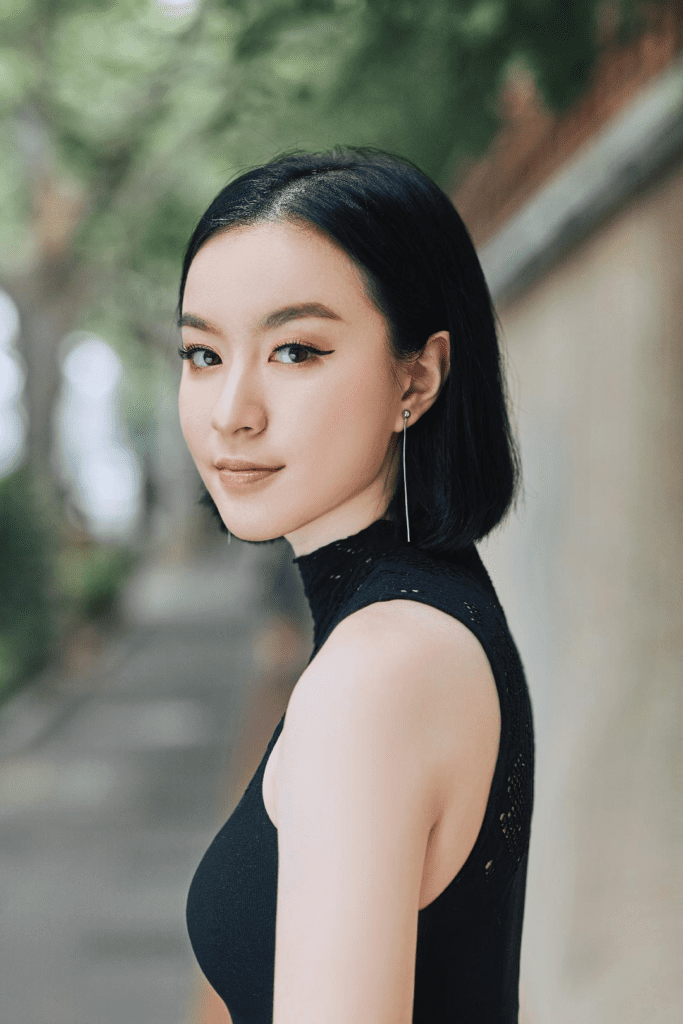

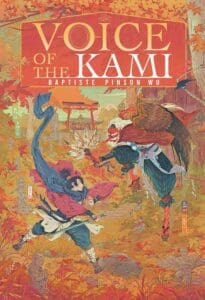
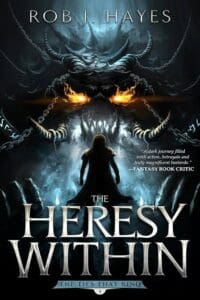
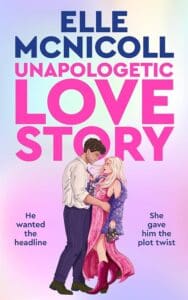
Leave a Reply